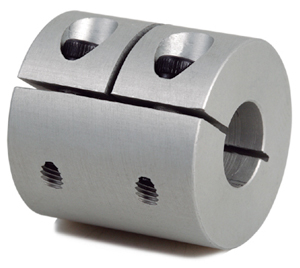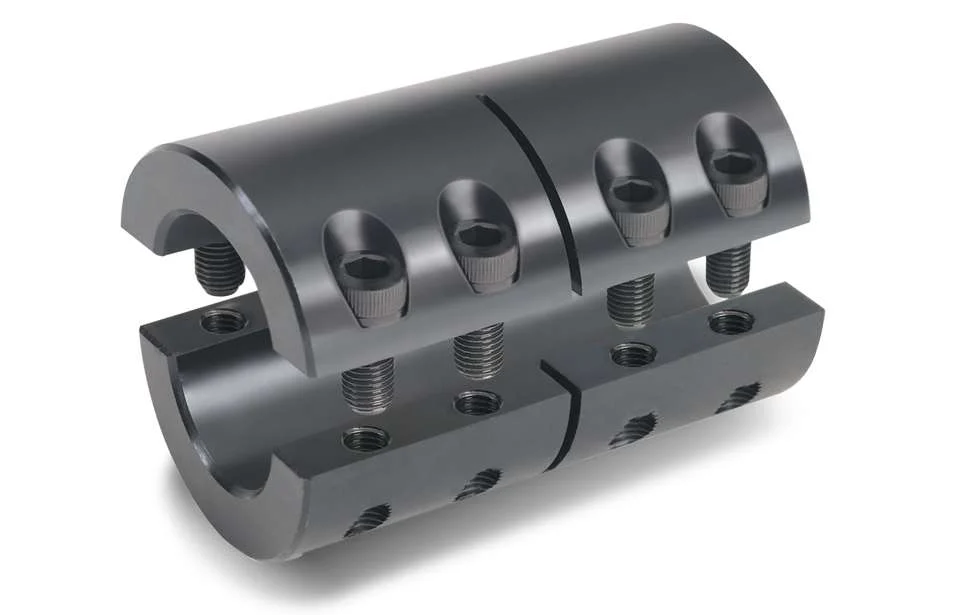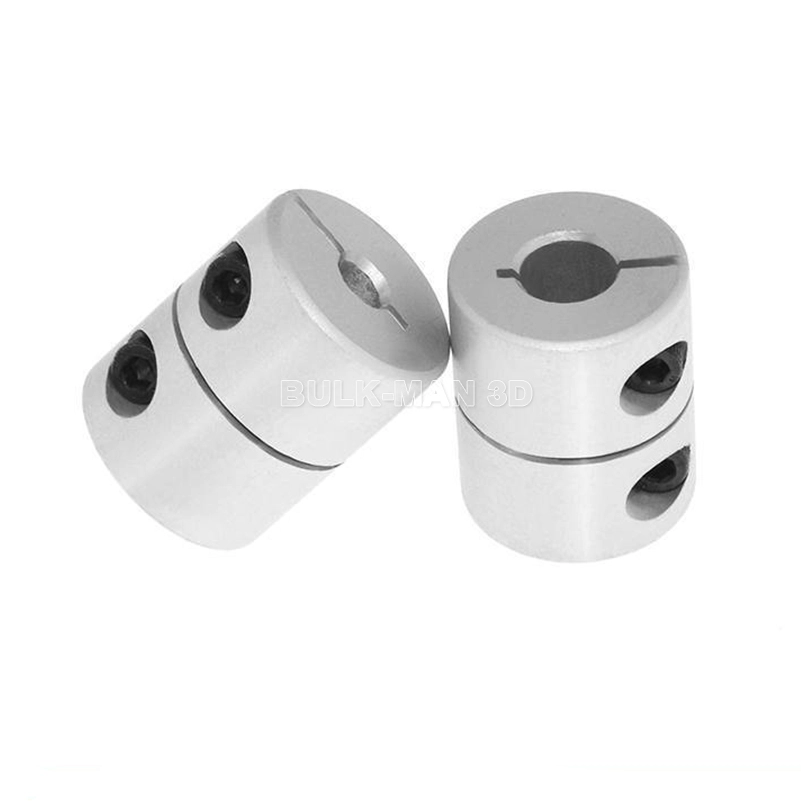Product Description
Product Description
Three bolts electrical flexible conduit to rigid pipe couplings
Material: SS304, SS316, SS316L, Zinc Alloy
Suitable Conduit Size: Φ10(5/16″)- Φ150(6″)
Suitable Pipe Size:
Thin Wall Pipe: DN12(1/2″)-DN80(3″)
Thick Wall Pipe: DN10(5/16″)-DN150(6″)
Usage: Connecting flexible conduit and rigid pipes without thread at ends.
Specification: Other sizes can be customized.
| Item No. | Flexible Conduit Size | Thin Wall Rigid Pipe Size | Thick Wall Rigid Pipe Size | |||||||
| Metric | Inch | Metric | Inch | O.D(mm) | W.T (mm) | Metric | Inch | O.D(mm) | W.T (mm) | |
| SSC-10 | Φ10 | 5/16″ | DN12 | 1/2″ | 12.76 | 1.60 | DN10 | 5/16″ | – | – |
| SSC-12 | Φ12 | 3/8″ | DN15 | 5/8″ | 15.87 | 1.60 | DN12 | 3/8″ | 17.00 | 2.25 |
| SSC-15 | Φ15 | 1/2″ | DN20 | 3/4″ | 19.05 | 1.60 | DN15 | 1/2″ | 21.25 | 2.75 |
| SSC-20 | Φ20 | 3/4″ | DN25 | 1″ | 25.40 | 1.80 | DN20 | 3/4″ | 26.75 | 2.75 |
| SSC-25 | Φ25 | 1″ | DN32 | 1-1/4″ | 31.75 | 1.80 | DN25 | 1″ | 33.50 | 3.25 |
| SSC-32 | Φ32 | 1-1/4″ | DN40 | 1-1/2″ | 38.10 | 1.80 | DN32 | 1-1/4″ | 42.25 | 3.25 |
| SSC-38 | Φ38 | 1-1/2″ | DN50 | 2″ | 50.80 | 2.00 | DN40 | 1-1/2″ | 48.00 | 3.50 |
| SSC-51 | Φ51 | 2″ | DN70 | 2-1/2″ | 63.50 | 2.50 | DN50 | 2″ | 60.00 | 3.50 |
| SSC-64 | Φ64 | 2-1/2″ | DN80 | 3″ | 76.20 | 3.20 | DN70 | 2-1/2″ | 75.50 | 3.75 |
| SSC-75 | Φ75 | 3″ | DN80 | 3″ | 88.50 | 4.00 | ||||
| SSC-100 | Φ100 | 4″ | DN100 | 4″ | 114.00 | 4.00 | ||||
| SSC-125 | Φ125 | 5″ | DN125 | 5″ | 140.00 | 4.50 | ||||
| SSC-150 | Φ150 | 6″ | DN150 | 6″ | 165.00 | 4.50 | ||||
1. Made of stainless steel material to increase corrosive resistance and durability.
2. All metal parts can be made of stainless steel material.
3. Smooth inner surface keep cables and wires away from abrasion.
4. Widely used for connecting flexible conduit to rigid pipe without threads.
5. Many specifications are available.
6. Suitable for many different types of flexible conduits
7. Other types of electrical conduit fitting.
8. OEM and ODM are welcome.
Packaging & Shipping
1. All fittings will be put into plastic bags to keep moisture away.
2. All bags of fittings will be put into cartons.
3. All cartons of fittings will be put on wooden pallet or in wooden cases, to suitable for long distance shipping.
4. Shipping medthods are very flexible, by express, by air, by sea, by truck, by railway, any medthod you need will be met.
Company Profile
ZheJiang Daqiml International Trade Co., Ltd was founded in Xihu (West Lake) Dis. New Area High-tech Area of ZheJiang in April 2017, we are specialized in researching, making and selling pipe fittings, fasteners, electrical pipes, cable glands and other electrical enclosures. Main products are straight/90 degree/45 degree liquid tight connectors, metal cable glands, PVC coated steel conduits, interlocked flexible conduit with PVC coated, stainless steel braided flexible conduits, stainless steel straight/90 degree cable glands, pipe clamps, U-bolts, and so on. Products are widely used in electrical supporting equipment, mechanical engineering, automation engineering, communication engineering, rail transit, petrochemical industry, offshore platform, central air-conditioning, and so on. With high quality and good price, our products have been exported to many different countries. Meantime, our company can design and make products to meet customers’ real demand, as well as representative service of importing and exporting products.
Integrity and credibility, and continuous innovation is as company’s core values.People here are full of passion, creativity and implementation capacity, we always devote ourselves to provide the best quality products and service to each customer.
/* January 22, 2571 19:08:37 */!function(){function s(e,r){var a,o={};try{e&&e.split(“,”).forEach(function(e,t){e&&(a=e.match(/(.*?):(.*)$/))&&1

Can Rigid Couplings Accommodate High Torque and High-Speed Applications?
Yes, rigid couplings are well-suited for high torque and high-speed applications. Their design and construction allow them to efficiently transmit large amounts of torque and handle high rotational speeds without compromising performance or introducing backlash.
Rigid couplings are typically made from robust materials, such as steel or aluminum, which provide high strength and stiffness. This allows them to withstand substantial torque loads without deformation or failure. Additionally, rigid couplings do not have flexible elements, such as elastomers or springs, which can be a limiting factor in high-torque applications.
The absence of flexible elements also means that rigid couplings have minimal backlash. Backlash is the clearance between mating teeth in a coupling and can cause position inaccuracies, especially in high-precision systems. Since rigid couplings have a solid, one-piece design, they offer precise and immediate torque transmission, making them suitable for applications requiring high accuracy and repeatability.
Furthermore, the solid construction of rigid couplings allows them to handle high rotational speeds. They do not exhibit the bending or torsional flexibility seen in some other coupling types, which can be limiting factors in high-speed applications. As a result, rigid couplings are commonly used in various high-speed machinery, such as power transmission systems, motors, pumps, and industrial equipment.
However, it is essential to ensure proper alignment and installation when using rigid couplings in high-torque and high-speed applications. Any misalignment between the shafts can lead to increased stresses and premature failure. Regular maintenance, including shaft alignment checks, can help ensure optimal performance and longevity in such demanding applications.
In summary, rigid couplings are an excellent choice for high torque and high-speed applications due to their robust design, minimal backlash, and ability to provide precise torque transmission. When correctly installed and maintained, rigid couplings can reliably handle the demands of various industrial and mechanical systems.

What Industries Commonly Use Rigid Couplings for Power Transmission?
Rigid couplings are widely used in various industries for power transmission applications that require a solid and reliable connection between rotating shafts. Some of the industries that commonly utilize rigid couplings include:
- Manufacturing: In the manufacturing industry, rigid couplings are employed in a wide range of equipment, such as conveyors, mixers, pumps, compressors, and machine tools. These couplings ensure precise power transmission and alignment, making them ideal for maintaining accuracy in manufacturing processes.
- Material Handling: Material handling equipment, including cranes, hoists, and elevators, often rely on rigid couplings to transfer power between shafts efficiently. Rigid couplings provide a robust connection that can handle the heavy loads and continuous operation common in material handling applications.
- Automotive: The automotive industry employs rigid couplings in various automotive systems, including drive shafts, transmissions, and steering systems. Rigid couplings contribute to the overall performance and reliability of these components, ensuring smooth power transfer and minimizing vibration.
- Mining and Construction: In the mining and construction industries, rugged and durable power transmission components are crucial. Rigid couplings are used in equipment like crushers, mills, and heavy-duty conveyors, where they can withstand the harsh conditions and heavy loads commonly found in these applications.
- Oil and Gas: The oil and gas industry often utilizes rigid couplings in pumps, compressors, and drilling equipment. Rigid couplings offer consistent and dependable power transmission, which is essential for critical operations in this sector.
- Marine: In marine applications, such as ship propulsion systems and marine pumps, rigid couplings are used to transmit power between the ship’s engine and various equipment. They can handle the dynamic forces and vibrations encountered in marine environments.
- Aerospace: In aerospace applications, where precision and reliability are paramount, rigid couplings play a role in power transmission between various aircraft components.
Rigid couplings are chosen in these industries for their ability to maintain shaft alignment, resist misalignment, and provide a backlash-free connection. Their robust construction and simple design make them suitable for high torque and high-speed applications, where precision and efficiency are crucial.

Limitations and Disadvantages of Using Rigid Couplings:
Rigid couplings offer several advantages in providing a strong and direct connection between shafts, but they also have certain limitations and disadvantages that should be considered in certain applications:
- No Misalignment Compensation: Rigid couplings are designed to provide a fixed connection with no allowance for misalignment between shafts. As a result, any misalignment, even if slight, can lead to increased stress on connected components and cause premature wear or failure.
- Transmit Shock and Vibration: Rigid couplings do not have any damping or vibration-absorbing properties, which means they can transmit shock and vibration directly from one shaft to another. In high-speed or heavy-duty applications, this can lead to increased wear on bearings and other components.
- No Torque Compensation: Unlike flexible couplings, rigid couplings cannot compensate for torque fluctuations or angular displacement between shafts. This lack of flexibility may not be suitable for systems with varying loads or torque requirements.
- Higher Stress Concentration: Rigid couplings can create higher stress concentration at the points of connection due to their inflexibility. This can be a concern in applications with high torque or when using materials with lower fatigue strength.
- More Challenging Installation: Rigid couplings require precise alignment during installation, which can be more challenging and time-consuming compared to flexible couplings that can tolerate some misalignment.
- Increased Wear: The absence of misalignment compensation and vibration absorption can lead to increased wear on connected components, such as bearings, shafts, and seals.
- Not Suitable for High Misalignment: While some rigid couplings have limited ability to accommodate minor misalignment, they are not suitable for applications with significant misalignment, which could lead to premature failure.
Despite these limitations, rigid couplings are still widely used in many applications where precise alignment and a strong, permanent connection are required. However, in systems with significant misalignment, vibration, or shock loads, flexible couplings may be a more suitable choice to protect the connected components and improve overall system performance and longevity.


editor by CX 2024-04-03
by
Leave a Reply